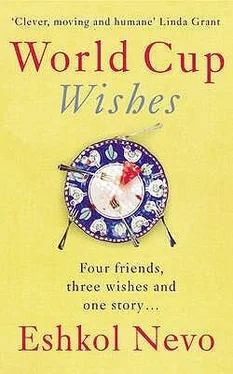Well, it really is an important case, isn’t it? A corrupt land deal and sexual bribery. Each of those is heavy enough in its own right.
Yes, but … I don’t know.
What? I asked, giving her a long, sideways glance.
Keep you eyes on the road, she said.
Then stop being so pretty, I almost blurted out the familiar next line of the regular dialogue we’d had when we were together.
Sometimes I think … she said, you know, those slips of paper, the wishes you wrote during the World Cup … He told me what his first wish was.
So?
It’ll sound stupid to you, but sometimes I think he’s obsessed with making it come true by the next World Cup. And he’s even said it to me a few times: I’ll be very disappointed if I don’t keep my promise to myself.
But that’s how you succeed in life, right? You set a goal and work towards it.
Yes, she said, turning her head to the window, but there’s also something obsessive about it.
We passed Hadera. I slowed down slightly. So our drive together wouldn’t end so quickly.
She was silent, looking out at the dark landscape.
Obsession is the name of a perfume, I said.
What?! she said and turned her head.
There was once a book called Obsession is the Name of a Perfume .
You read it?
No, I just remember the name.
She turned her head back to the window. What a fool I am, I flogged myself. I thought she’d remember. We’d once played a game when we went down to the Sinai desert together. One of us said the name of a book and the other had to answer with the name of a book that began with the last letter of the first one. East of Eden , she could have said. Or Emma . There are plenty of books that begin with the letter ‘e’. But she didn’t remember the game at all.
You’re such Haifa boys, she said suddenly (the car had just crossed that point — a bit after Hadera — after which Tel Aviv is closer than Haifa).
Why? What do you mean? I said defensively.
That whole idea … of the wishes … during the World Cup … and how you all are now … with Amichai … it’s so Haifa.
Be more specific, I said. What does that ‘Haifa’ mean?
I don’t know, Ya’ara said and stopped speaking. It wasn’t till Netanya — when I already thought she’d forgotten — that she said: you all care.
What?
You wanted me to define that Haifa quality you have. So here’s the definition: you all care about each other. And there’s something sort of old-fashioned about it, you know. These days, no one really cares about anything. Except money.
Now that’s a huge generalisation. There are also a few people in Jerusalem who care.
No, it’s just the Haifaites. And you know what? Actually, it’s only the four of you. The world around you has become more and more cynical and violent, and you four hold on to that closed group of yours, where people care about each other.
But that’s exactly the definition of friends, isn’t it? An oasis that lets you forget the desert … or … a raft whose logs are glued to each other. Or … a small country surrounded by enemies. Don’t you think?
I have no idea, Ya’ara said. You know I never had any friends.
I didn’t say anything, and changed the radio station. I knew very well where that I-have-no-friends complaint was leading and I didn’t want to have that conversation again where I lie to her that it’s bad luck or a sorry coincidence that she has no friends except for her boyfriend, when it was clear to both of us that she just wasn’t ready for the commitment that friendship with someone not in love with her demanded.
Tell me, she said, turning her whole body towards me after a brief silence (the strong fragrance of citrus trees filled the car, even though the windows were closed), what did you write?
Where? I asked, feigning ignorance.
On those World Cup slips of paper. What was your wish?
Churchill didn’t tell you?
I couldn’t get him to tell me.
So you won’t be able to get me to tell you either, I said and stepped on the accelerator.
It’s OK, she said with an old, familiar gentleness. If you don’t want to, don’t tell me. I was just curious … You talk so little about yourself. So I thought … you know what … Just tell me this. The wish you made, are you close to fulfilling it? Do you think you’ll fulfil it?
No way. Every day that passes just takes me further away from it, I said.
That’s sad … It makes me sad to hear that, she said. And then she touched me softly on the shoulder and smiled: but it’s a long time till the next World Cup, right?
Yes, almost two years.
So who knows.
Who knows, I repeated her words and kept driving. The shoulder she touched was burning. And continued burning, the way your body feels after you get sunburned at the beach, till we were in Tel Aviv. At their flat.
You’ve never actually been in our place, she asked-said.
No, it’s just never happened, I said and thought that, even without having to be physically present inside it, I knew exactly what their flat looked like: hanging on the living room wall was that red cloth he’d brought from Bolivia and had moved with him to all of his previous flats. In the corner was her small dressing table that impossibly bore the enormous weight of all the objects lying on it. Above it was her collection of old posters of London theatre productions. In another corner were, of course, a few wretched plants (he always put plants in his flats and then didn’t have the energy to look after them). In their fridge was Diet Coke, Diet Sprite and low-fat cheese slices because he was afraid of getting as fat as his father had become lately. And in their medicine cabinet was a packet of sleeping pills because she was afraid she wouldn’t fall asleep at night. They had one small TV because he thinks that having a large TV is corrupt. And above the TV was a large picture of London because she’d been there with her parents when she was a child and was planning to go back to study when she had ninety-one thousand dollars. There was a huge bed in the bedroom, the kind she liked. And under the bed, next to his wide, bursting shoes stood her small, delicate ones. And the smell of her had collected between the tight, light-coloured sheets, the smell of her skin and hair and sweat and juices –
You want to come up for a drink? she interrupted my thoughts. Her tone was mainly polite.
Yes, I thought. I want to come up. Of course I want to come up. And on the steps, I want to grab you hard around the waist. And give you a small, fluttery kiss on the back of your neck. Where your spine ends. And then, inside the apartment, I want to bury my nose in your hair and smell your scent, smell you until the smell turns into taste, and then, still from behind, I want to unbutton your white blouse. The first two slowly, and the others, I’ll rip open. Because I just can’t any more. Because I can’t any more can’t any more can’t any more –
No, thanks, I said. I think I’ll go home.
*
(Once, on a school trip, I wrote to a girl on her back. My fingers meandered over her thin blouse and, letter after letter, I wrote her name. I didn’t have the courage to write the real thing.)
*
I called Hani while I was still on the road, and as I was punching in the numbers, I already knew I was making a mistake. That this wasn’t a good time. But still I asked her to come over. And she said yes, as usual. And she knocked on the door, as usual, two tentative knocks, even though I’d told her a thousand times that she could come in without knocking. I opened the door for her. And she stood there in the doorway with her beautiful hair loose because I liked it that way. And her deep, secular neckline. And waited for me to hug her. So I hugged her. Tightly. Especially because I wasn’t feeling anything, I hugged her very tightly. And she said, wow, it was worth stepping out of the fold for that hug alone. And suddenly, that ‘stepping out of the fold’ annoyed me. Why can’t she say ‘I stopped being religious’ and leave it at that? Suddenly everything about her annoyed me. The beautiful Hebrew, the naivety. The transparent dreams of homesickness about her mother that she dreamed at night, then asked me to interpret in the morning. And the two charming little stories about her day that she dredged up for me — the taxi driver who listened to meditation chants, the guy who fell asleep in the library with his head on Maseket Baba Metzia from the Talmud — those two stories annoyed me too. And I didn’t know what to do with this irritation, not a familiar feeling for me, and she didn’t deserve it. So I touched her and started to undress her, perhaps the contact would make me forget it. But it was all so bland and ended quickly. Even though I was horny, I came in a minute. And she was fine about it, really nice, which just annoyed me even more. And suddenly I wanted her to go. To get up and go and take all those things of hers that had messed up my neat flat: her shampoo. Her soap. Her shirt. Her hairbrush. Those childish loose-leaf binders with the hearts on the covers. I wanted her to put them all into large rubbish bags and go and let me be quietly alone with Ya’ara’s sock.
Читать дальше












